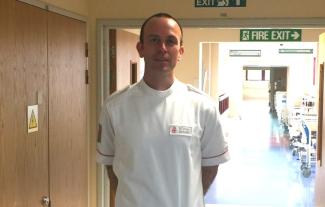
Let's talk about health

Registered Nurse Ben Collier talks about his stammer, changing career, links between sexual health and stammering, and why it is important now more than ever to talk about your health.
It was only recently that my mum told me about the emotional conversations she had with my primary school head teacher. She was called in to talk about the fact that my twin brother Tom and I were struggling with school, possibly in relation to our speech, and we needed to prepare for below-average education achievements.
I was bullied at school but reflecting on it, I needed to stop focusing on the negatives of what happened and more on the positives. Moving from a private school to secondary school was a big shock for me, and especially as the classroom numbers went from 10 to 30, which was something novel to me. The bullying continued even with intervention from the school. Nevertheless, despite challenges faced I was able to achieve qualifications.
Joining the Nursing Corps
I went to college, then to university and never really knew what I wanted to do in life. I then joined the Territorial Army (Reserves), and then the Regular British Army. Spending time in the Army opened my eyes to other career options available to me. I became a Registered Nurse in the Queen Alexandra's Royal Army Nursing Corps, and have been doing my qualified job now for over three years after achieving a first-class honours degree in adult nursing. While in nursing, I continue to support and assist the Defence Stammering Network, which is a network of support for people who stammer in the armed forces (see our Communities & Groups page for more information).
The senior charge nurse said I had some balls doing this job. I agreed, but having a stammer should not be a barrier to being employed in any job you want to be in.
My student nurse years were hilarious. Because of my stammer, staff were proud that I answered the phone and that I wanted to do nursing. I would always say I like talking to people. On my final management placement, the senior charge nurse said I had some balls doing this job. I agreed, but having a stammer should not be a barrier to being employed in any job you want to be in.
Working in sexual & reproductive health (SRH)
I am currently undertaking specialist training in sexual and reproductive health, which involves talking to clients privately in face-to-face consultations. If I feel the tension in my speech before going to clinic, I will do a group disclosure to the clients waiting in the waiting room, promoting the fact that I am a person who stammers. This has helped open my comfort zone and make my day happier. Covid-19 has created new challenges, with changes in practice where telephone and video consultations now take the lead. I continue to do self-disclosures to clients about my stammer — I get positive feedback and they do not see it as an issue.
Working in sexual and reproductive health has taught me how important it is to communicate. In healthcare we do have, and are developing, more support groups for staff. But we also need to support those who stammer. There is research on the importance of support groups for persons who stammer, but nothing on supporting them when accessing healthcare. Dr. Vaughan Parsons, a research manager/research fellow, is currently researching occupational health support for healthcare workers who stammer.
Stigma & prejudice
I see a parallel link between those who stammer and people accessing sexual and reproductive health services. The link is the combined issues of stigma, stereotype, prejudice or discrimination, both externally and internalised. These issues form barriers to accessing healthcare for persons who stammer. It is not helped by individuals' preconceptions to accessing sexual and reproductive health services.
I want to bring the stammering community together to promote safer sex and to raise awareness of sexual and reproductive health services.
When I say safer sex, I do not mean safe sex, which is the old term used to explain sexual activity using methods or devices to reduce the risk of sexually acquired infections. Safer sex is about engaging in conversation to make you aware of the risks of having unprotected condomless sexual intercourse. Condomless sex is increasing in the UK, with an increase in sexually acquired infections and use of emergency contraception.
I want to bring the stammering community together to promote safer sex and to raise awareness of sexual and reproductive health services in your area. I would like to hear your stories about accessing healthcare. Together, STAMMA can support persons who stammer using these as case studies and developing focused awareness campaigns.
#sexualhealth #safersex
If you'd like to share your experiences with Ben, email editor@stamma.org and we'll pass them on. If you'd like to write an article see our Submit Something For The Site to find out how.



































